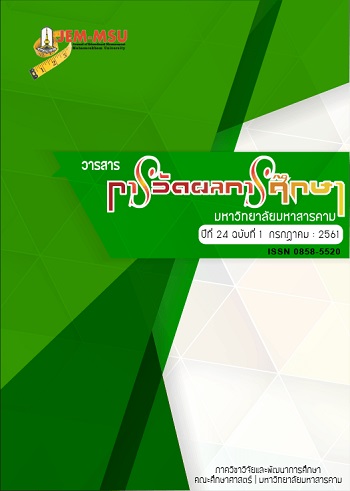Development of the Process Skill Test in Mathematics for Primary Education Grade 6 of Uttaradit Rajabhat University Demonstration School
Main Article Content
Abstract
The objectives of this study were to develop the process skill test in mathematics
for primary education grade 6 of Uttaradit Rajabhat University Demonstration School. To
meet the standard for quality of placement test and develop criteria for the minimum
passing level of the process skill test in mathematics. In the research there were 159
students from primary education grade 6 for academic year 2560 of Uttaradit Rajabhat
University Demonstration School. The sample group for research was 112 students from
primary education grade 6. They were selected with stratified random sampling whom were
classified from grades in primary mathematics for academic year 2559. The instruments for
process skill test in mathematics were assessment of quality tools by analysis was in aspect
of validity content, structure, item difficulty, item discrimination, reliability and statistics used
to analyze data were percentage, mean, standard deviation, standard error mean and
minimum passing level of Ebel.
Result showed that the test attained the standard requirements: P (0.20 to 0.80) ;
the discrimination (0.21 to 0.66) ; the reliability (0.961) ; the mean (73.03) ; the standard
deviation (22.94) ; the standard error mean (1.82) ; and the minimum passing level of the
process skill test in mathematics by teaching professionals indicated that the minimum
percentage of problem solving skill, connection skill, reasoning and proof skill and
communication skill were 80, 65, 80 and 65 respectively. The minimum percentage of the
total test was 80.
Article Details
The content and information contained in the published article in the Journal of Educational Measurement Mahasarakham University represent the opinions and responsibilities of the authors directly. The editorial board of the journal is not necessarily in agreement with or responsible for any of the content.
The articles, data, content, images, etc. that have been published in the Journal of Educational Measurement Mahasarakham University are copyrighted by the journal. If any individual or organization wishes to reproduce or perform any actions involving the entirety or any part of the content, they must obtain written permission from the Journal of Educational Measurement Mahasarakham University.
References
โรงพิมพ์ชุมนุมสหกรณ์การเกษตรแห่งประเทศไทย.
2. จินตนา อุบล. (2557). การสร้างแบบทดสอบทักษะกระบวนการทางวิทยาศาสตร์พื้นฐานส าหรับนักเรียน
ประถมศึกษาปีที่ 6 โรงเรียนสังกัดส านักงานเขตพื้นที่การศึกษาประถมศึกษาสงขลา เขต 3.
วิทยานิพนธ์ปริญญาครุศาสตรมหาบัณฑิต, สาขาวิชาวิทยาศาสตรศึกษา บัณฑิตวิทยาลัย
มหาวิทยาลัยราชภัฏสงขลา.
3. ชัยวิชิต เชียรชนะ. (2552). การพัฒนาแบบวัดกลยุทธ์การเรียนรู้แบบพหุมิติส าหรับนักเรียนมัธยมศึกษา
ตอนปลาย.วิทยานิพนธ์ปริญญาดุษฏีบัณฑิต, สาขาการวัดและประเมินผลการศึกษา
คณะครุศาสตร์ จุฬาลงกรณ์มหาวิทยาลัย.
4. บุญธรรม กิจปรีดีบริสุทธิ์. (2537). เทคนิคการสร้างเครื่องมือรวบรวมข้อมูลส าหรับการวิจัย. กรุงเทพ:
โรงพิมพ์แห่งจุฬาลงกรณ์มหาวิทยาลัย.
5.พิสณุ ฟองศรี. (2552). การสร้างและพัฒนาเครื่องมือวิจัย. กรุงเทพ : บริษัทด่ านสุทธาการพิมพ์จ ากัด.
6. ศิริชัย กาญจนวาสี. (2552). ทฤษฎีการทดสอบแบบดั้งเดิม. พิมพ์ครั้งที่ 6. กรุงเทพ: โรงพิมพ์แห่งจุฬาลงกรณ์
มหาวิทยาลัย.
7. สมนึก ภัททิยธนี. (2546). การวัดผลการศึกษา. พิมพ์ครั้งที่ 4. กาฬสินธุ์: ประสานการพิมพ์.
8. สมนึก ภัททิยธนี. (2551). การวัดผลการศึกษา. พิมพ์ครั้งที่ 6. กาฬสินธุ์: ประสานการพิมพ์.
9. สถาบันส่งเสริมการสอนวิทยาศาสตร์และเทคโนโลยี. (2546). คู่มือการจัดการเรียนรู้กลุ่มสาระการเรียนรู้
คณิตศาสตร์. กรุงเทพ : สถาบันส่งเสริมการสอนวิทยาศาสตร์และเทคโนโลยี.
10. สถาบันส่งเสริมการสอนวิทยาศาสตร์และเทคโนโลยี. (2551). มาตรฐานการเรียนรู้คณิตศาสตร์. กรุงเทพ :
สถาบันส่งเสริมการสอนวิทยาศาสตร์และเทคโนโลยี.
11. สถาบันส่งเสริมการสอนวิทยาศาสตร์และเทคโนโลยี. (2553). คู่มือวัดและประเมินผลคณิตศาสตร์. กรุงเทพ :
สถาบันส่งเสริมการสอนวิทยาศาสตร์และเทคโนโลยี.
21. สถาบันส่งเสริมการสอนวิทยาศาสตร์และเทคโนโลยี. (2556). ผลการประเมิน PISA 2012 คณิตศาสตร์
การอ่าน และวิทยาศาสตร์ . กรุงเทพ : สถาบันส่งเสริมการสอนวิทยาศาสตร์และเทคโนโลยี.
13. สมศักดิ์ สินธุรเวชญ์. (2545). การวัดผลและประเมินผลการเรียนรู้หลักสูตรการศึกษาขั้นพื้นฐาน
พุทธศักราช 2544. กรุงเทพ : โรงพิมพ์ไทยวัฒนาพานิช.
14. สุกัญญา ทองนาค. (2555). การพัฒนาแบบทดสอบสมรรถนะนักศึกษาตามมาตรฐานวิชาชีพครูแบบพหุมิติ
ที่มีการตรวจให้คะแนนแบบพหุวิภาค. วิทยานิพนธ์ปริญญาดุษฏีบัณฑิต, สาขาการวัดและ
ประเมินผลการศึกษา คณะครุศาสตร์ จุฬาลงกรณ์มหาวิทยาลัย.
15. Berk,R.A. (1986). A Guide To Criterion-Referenced Test Construction. London.TheJohn
Hopkins University Press.
16. Ebel,R.L. (1962). Content standard test score. Educational and Psychological
Measurement. 22 ,15-25.
17. Ebel,R.L. (1979). Essentials of educational measurement. (3rd ed.). Englewood
Cliffs,NJ:Prentice-Hall.
18. Robert M. Kaplan, Dennis P. Saccuzzo. (2012). Psychological Testing. USA : Jon-David
Hague.
19. Zieky,J.M. (2008). Cut scores : A Manual for Setting Standards of Performance on
Educational and Occupational Tests. Educational Testing Service.


